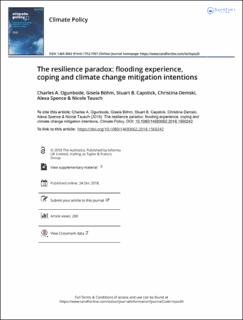The resilience paradox: Flooding experience, coping and climate change mitigation intentions
Ogunbode, Charles Adedayo; Böhm, Gisela; Capstick, Stuart; Demski, Christina; Spence, Alexa; Tausch, Nicole
Peer reviewed, Journal article
Published version
Permanent lenke
https://hdl.handle.net/11250/2689679Utgivelsesdato
2018Metadata
Vis full innførselSamlinger
Sammendrag
Climate change is projected to increase the frequency, intensity and unpredictability of extreme weather events across the globe and these events are likely to have significant mental health implications. The mental health literature broadly characterises negative emotional reactions to extreme weather experiences as undesirable impacts on wellbeing. Yet, other research in psychology suggests that negative emotional responses to extreme weather are an important motivation for personal action on climate change. This article addresses the intersection of mental health and functional perspectives on negative emotions, with a specific focus on the potential that reduced negative emotional responses to extreme weather may also translate to diminished motivation to undertake climate change mitigation actions – which we term the ‘resilience paradox’. Using survey data gathered in the aftermath of severe flooding across the UK in winter 2013/2014, we present new evidence indicating that self-appraised coping ability moderates the link between flooding experience and negative emotions and thereby attenuates the indirect link between flooding experience and climate change mitigation intentions. We conclude that support for flood victims should extend beyond addressing emotional, physical and financial stresses to include acknowledgement of the involvement of climate change and communication of the need for action to combat future climate risks.
Key policy insights:
- Psychological resilience to flooding and other extreme weather events can translate to diminished motivation to mitigate climate change
- Negative emotional reactions need to occur at an optimal level to enable people to respond appropriately to climate risks.
- Flood victims’ subjective appraisal of their ability to cope does not necessarily encompass consideration of the role played by climate change. Therefore, support for victims of extreme weather should include explicit acknowledgement of the involvement of climate change and the need for action to mitigate future climate risks.
Beskrivelse
© 2018 The Author(s). Published by Informa UK Limited, trading as Taylor & Francis Group. This is an Open Access article distributed under the terms of the Creative Commons Attribution License (http://creativecommons.org/licenses/by/4.0/), which permits unrestricted use, distribution, and reproduction in any medium, provided the original work is properly cited.

